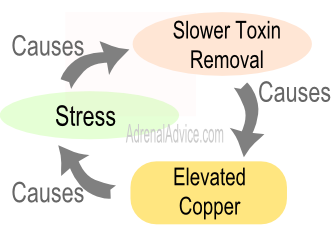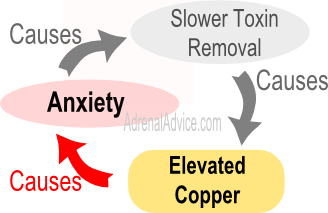Copper & Adrenal Fatigue
- Chronic stress results in copper accumulation
- .... and excess copper increases anxiety and stress
Although copper is essential, it becomes a toxic metal if your copper levels are too high2.
There are several reasons why chronic stress causes you to accumulate copper.
Unfortunately, excess copper then creates stress, setting up a positive feedback loop.

In a nutshell ....when all available energy is dealing with a stressor, your body simply does not have enough energy left to deal with toxins.
It is similar to how your immune system shuts down during stress.
Your body stops dealing with toxins and infections while you are in fight or flight.
This makes sense in the short term, but if you remain in fight or flight, toxins will continue to accumulate.
Eventually, elevated copper becomes a source of stress, setting up the feedback loop.
Note: 45.8% of site visitors answered Yes to have a metallic taste in their mouth.
(survey of 222 people).
Stress, Estrogen and Copper
Both short term acute stress and long-term chronic stress increases estrogen22,23.
And estrogen increases the amount of copper retained by your body21,24.
Stress --causes--> Increased Estrogen --causes--> Increased Copper.
Reduced Bile from Stress
- Bile is needed to remove excess copper (and other toxins)
- Stress slows bile production
Bile is produced in the liver to aid in the digestion of fats5. Bile is stored and concentrated in the gallbladder waiting for you to eat fats.
Bile also carries toxins6, 7. Therefore, bile is used to digest fats and remove toxins.
The main path for elimination of excess copper is bile8, 9, which is eliminated through your gastrointenstinal tract.
However .... when you are in fight or flight, your sympathetic nervous system is more active.
As noted in the quote below, when the stressed side of your nervous system is more active, less bile is secreted.
....the parasympathetic nervous system plays a role in mediating bile secretion. By contrast, stimulation of the sympathetic nervous system results in reduced bile secretion and relaxation of the gallbladder. 4
A study completed by the Department of Biology of Georgia State University found that chronic stress results in the gallbladder retaining bile20.
So to summarize:
Stress --causes--> Less Bile --causes--> Less Copper removed.
Note: Coffee Enemas are very helpful for improving bile flow.
Vitamin C used up during stress
- Vitamin C is needed to help the liver remove toxins
- But other sources of stress
use up
Vitamin C
Your adrenals need Vitamin C to function. Vitamin C is a cofactor (required input) for both the adrenal cortex and the adrenal medulla 12.
Any stressor will cause your body to use Vitamin C quickly11.
The source of stress doesn't matter. Toxins, infections, exercise, psychological stressors all cause you to use up Vitamin C.
However, Vitamin C also helps the liver complete one of it's main functions, which is the removal of toxins11.
Vitamin C also can act as a chelating agent, meaning that it can bind to toxic metals (including copper) for removal.
A given chemical toxin can make the body's ability to cope with other challenges all the more difficult by lowering the vitamin C level in the course of its detoxification11.
However ..... this also works in reverse.
Other sources of stress will leave less Vitamin C be available to help deal with copper and other toxins.
Stress --causes--> Less Vitamin C --causes--> Less Copper removed.
Glutathione and Stress
- Glutathione protects you from Copper Toxicity
- Other sources of stress reduce your Glutathione levels
If you are a newbie
, you might not know about Glutathione.
It is an amino acid and anti-oxidant. It is a non-essential amino acid, which means that your body can make Glutathione.
Glutathione has important roll to play in handling all toxins.
Glutathione's main job is to help the liver detoxify harmful compounds through the bile.15
So Glutathione helps do detoxify all toxins. What about copper specifically?
.. research shows that the copper-binding protein, metallothionine, cannot pick up the copper ion directly, but requires the sulfur-based amino acid glutathione to act as an intermediary. 17
And what happens to glutathione with stress?
Chronic stress results in depletion of glutathione, as well as reduces production of glutathione17,18.
So to sum up:
Stress --causes--> Less Glutathione --causes--> Less Copper removed.
Copper increases Stress
Unfortunately, once you have developed copper overload, it starts to become a source of stress, which closes the feedback loop.
See the article:
Copper, Anxiety & Stress
, which explains how excess copper can create anxiety and stress.
Recommended Book
A great book to learn about stress, copper toxicity, and adrenal fatigue is:
Why Am I Always So Tired
, by Ann-Louise Giddleman.
This book will connect a lot of dots for you.
Sample Hair Analysis for Copper

Sample Hair
Analysis of
Copper
The bar to the left shows a sample hair analysis for Copper (one of mine).
You are reading that correct. It is off the scale.
- The Ideal Range is 1.5 to 3.25
- The sample value is 24.2... 7.3 times the top of the reference range
If you would like see the full hair tissue mineral analysis report, here it is:
2014-03-27-ARL-Hair Tissue Mineral Analysis.
I am currently working on a copper detox program. So copper that had accumulated for years and years is coming out of storage. It takes a while.
Nutritional Balancing is the name of the program, and it works on balancing mineral levels and eliminating toxic metals.
If you would like to see how all toxic metals keep trending higher and higher as I
continue to get better at eliminating toxins, see the article:
Heavy Metal Detoxification Trends
Summary
If you have been stuck in a state of stress for years, it is very likely that your removal of copper and other toxins has been reduced for years (like me).
It can take a long time to get rid of toxins that you have spent years accumulating.
I have been working on detoxification for almost 3 years. It takes a while to get the gallbladder going again.
Good luck what ever protocol you are working on. You should consider giving the Nutritional Balancing program a try.
References
1. Copper toxicity2. The Role of Glutathione in Copper Metabolism and Toxicity - The Journal of Biological Chemistry, 1989
3. https://neurokinesiology.nuxit.net: >THE AUTONOMIC NERVOUS SYSTEM
4. Medical Physiology: Principles of Clinical Medicine by Rodney Rhoades and David R. Bell 4th edition published by Wolters Kluwer
5. Bile- Wikipedia
6. Intestinal excretion of toxic substances
7. Elimination of Toxins
8. Human whole-body copper metabolism
9. Copper and Zinc, Biological Role and Significance of Copper/Zinc Imbalance
10. Influence of ascorbic acid supplementation on copper status in young adult men.
11. Levy MD JD, Thomas E. (2011-08-31). Vitamin C, Infectious Diseases, and Toxins.
12. Vitamin C is an important cofactor for both adrenal cortex and adrenal medulla
13. The Role of Glutathione in Copper Metabolism and Toxicity
14. Glutathione
15. Dr. Rowe, Carl (2011-10-27). Glutathione
16. Cellular glutathione plays a key role in copper uptake mediated by human copper transporter 1
17. Gittleman, Ann Louise (2010-07-18). Why Am I Always So Tired?: Discover How Correcting Your Body's Copper Imbalance Can. HarperCollins.
18. Glutathione depletion, lipid peroxidation and mitochondrial dysfunction are induced by chronic stress in rat brain
19. Chronic restraint stress decreases the expression of glutathione S-transferase pi2 in the mouse hippocampus
20. The gall of subordination: changes in gall bladder function associated with social stress.
21. Effect of estrogen on serum and tissue levels of copper and zinc
22. Acute stress persistently enhances estrogen levels in the female rat
23. Chronic stress increases estrogen and other steroids in inseminated rats
24. Serum copper elevation from estrogen effect, masquerading as fungicide toxicity



